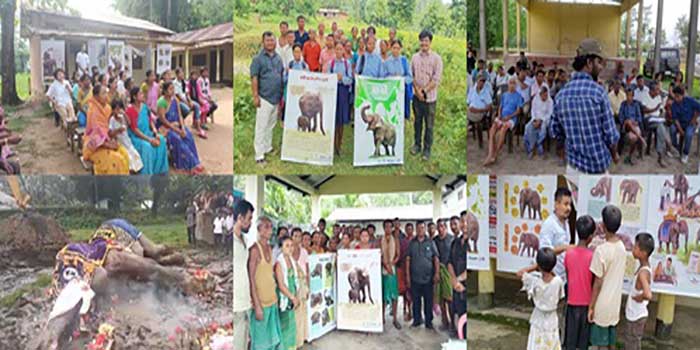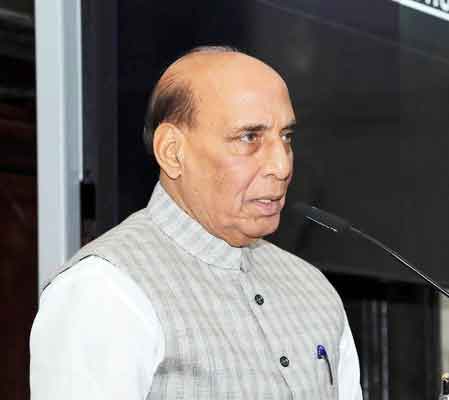Deaths of people due to human-elephant conflicts is on the rise in Assam with 118 people losing their lives since last year. During the same period, as many as 29 wild elephants have died, either after being run over by trains or other reasons, including electrocution.
The loss lives is mostly caused as a large number of pachyderms often come out of the forests in search of food.
Assam Forest and Wildlife officials said that 73 people were killed due to elephant attacks last year, while 45 have died so far this year. The victims included many women.
In all, 21 elephants were killed due to accidents with running trains, electrocution and other mishaps last year, while eight have died so far this year owing to similar misfortunes.
According to reports, between 1990 and 2018, a total of 115 elephants died in Assam due to train hits.
Assam's Forest and Environment department officials said that 71 elephants, including calves, were killed in 2021 mainly due to train hits, poisoning, electrocution, and accidental deaths, including falling into ponds and ditches, and lightning strikes.
In May 2021, 18 jumbos were killed in a lightning strike in Nagaon district in central Assam.
According to the latest census, India is home to 27,312 elephants and of them, Assam is home to 5,719 elephants, the second largest pachyderm population in India after Karnataka (6,049).
According to the India State of Forest Report-2019, Assam has only 36.11 per cent forest cover out of its total geographical area of 78,438 sq km.
Out of the total 28,327 sq km forest area, only 2,795 sq km comprises dense forest, while 10,279 sq km area is moderately dense forest.
Northeast India’s leading biodiversity conservation organisation 'Aaranyak' has launched a massive 'Gajah Kotha' (The Elephant Story) campaign involving over 1,500 people to mitigate human-elephant conflict in Assam and Meghalaya.
To address the pressing issue of the increasing human-elephant conflict in Assam and Meghalaya, Aaranyak and the British Asian Trust, in partnership with the Assam and Meghalaya Forest Departments and with support from the Darwin Initiative, are implementing the 'Gajah Kotha' initiative as part of their efforts for fostering coexistence between local communities and elephants.
The initiative targets human-elephant conflict-affected villages and educates people about the elephants' behaviour, ecology, and cultural connection to the region and the importance of their conservation.
“We developed the Gajah Kotha campaign through multiple brainstorming sessions and launched it to facilitate coexistence between humans and elephants in Assam and Meghalaya.
"The campaign illustrates dynamic ways to coexist with the gentle giants, which are also India's national heritage animals. We work with a wide range of stakeholders in the society through Gajah Kotha, including students, community leaders, commoners, government departments, and NGOs, and we are looking forward to working with many more stakeholders to promote coexistence, which will ultimately contribute to the conservation of Asian elephants,” said Bibhuti Prasad Lahkar, senior scientist and head of the Elephant Research and Conservation Division.
Aaranyak’s conservation biologist Alolika Sinha said that educating locals on the causes of human-elephant conflict and how we can sustainably increase their capacity is an important component of mitigating the conflict, promoting coexistence and safeguarding people's well-being.
“Moreover, we must work towards a long-term approach such as securing habitats and elephant corridors to reduce human-elephant conflict and ensure conservation of elephants and other biodiversity" she added.
According to Aaranyak, 24 Gajah Kotha campaigns have so far been conducted at Majuli's Haldibari, Jaborchuk Kathoni, Gazera, Gazera High School, Ujani Majuli Kherkatia High School, Pub Majuli Kherkatia HS School, Jaborchuk Basa, and Jopanchuk.
The campaign was also held in many areas of Dibruagarh, Tinsukia, Sivasagar, Jorhat and other districts.
“Our community educators, field staff, and village champions are working relentlessly on this coexistence initiative in Assam, home to a well-established elephant population,” said Zakir Islam Bora, an Aaranyak official in charge of the initiative in eastern Assam.
"We launched the outreach campaign 'Mongma Golpo' (elephant stories) in the West Garo hills district in Meghalaya on the occasion of World Elephant day on August 12 using the IEC materials," Bora said.
So far, the leading NGO has conducted four such outreach campaigns, mostly targeting villagers, majority of whom belong to the indigenous communities of Garo, Rabha and Bodo in the villages of Jamdamgre, Borogobol, Lower Darenchigre and Lower Kharsendap.
Aaranyak is also working in other human-elephant conflict hotspots and has adopted a multi-pronged and multi-stakeholder approach to conserve biodiversity, reduce conflict and ensure human well-being.






Pak propaganda alert: Sukhoi shot down, pilot captured; PIB says 2014 image of crash
The government on Friday trashed Pakistani social media handles claiming that a Sukhoi Su-30MKI was shot down in Muzaffarabad, and an Indian Pilot was captured.
India-Pak conflict affects 11 pc of daily domestic air traffic: Industry data
As tensions flare up between India and Pakistan, at least 11 per cent of the daily domestic air traffic has been affected following the shutdown of 24 airports in the country, data showed on Friday.
Defence Minister reviews 'Operation Sindoor', ongoing situation with military chiefs
Defence Minister Rajnath Singh on Friday held a high-level meeting at the Defence Ministry to review 'Operation Sindoor' and assess the current security situation along the border with Pakistan.
Defence Ministry advisory: Refrain from live coverage of operations, security forces' movement
The Ministry of Defence on Friday issued an advisory to the media to refrain from showing live coverage of defence operations and movement of security forces.
India is always a winner: CM Yogi lauds armed forces amid India-Pak tensions; calls for national unity
Uttar Pradesh Chief Minister, Yogi Adityanath, while addressing a gathering in Lucknow on the occasion of Maharana Pratap Jayanti on Friday, delivered a strong message of national unity amid escalating tensions between India and Pakistan.
IPL 2025 suspended indefinitely, BCCI cites national interest: Sources
Amid the escalating military conflict between India and Pakistan, the BCCI has decided to suspend the ongoing Indian Premier League (IPL) 2025 season indefinitely in an emergency meeting on Friday, sources told IANS.
Army releases video of India destroying Pakistani military post
The Indian Army has released the first video of a strike carried out at a Pakistani military post, responding to the cross-border firing by Islamabad troops in the face of escalating tension between the two countries.
Pakistan attacked with multiple missiles and drones, all effectively repulsed: Indian Army
Pakistan Armed Forces launched multiple attacks using drones and other munitions along the entire Western border on the intervening night of May 8 and May 9, Indian Army officials said.